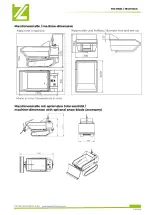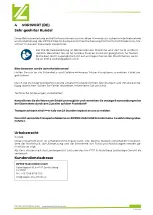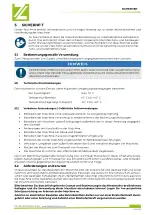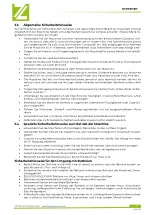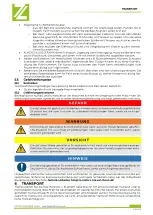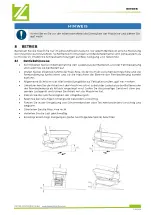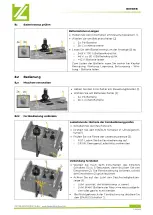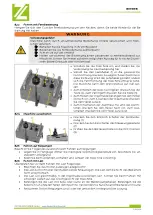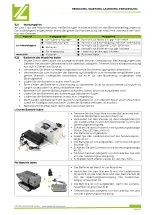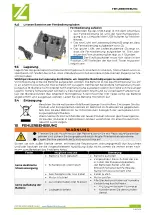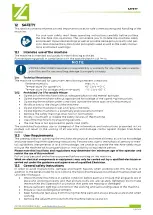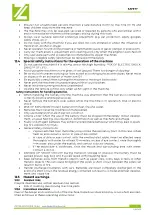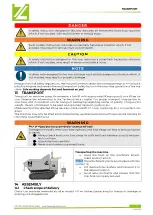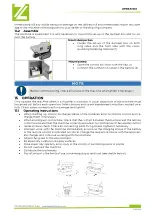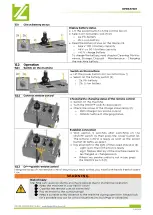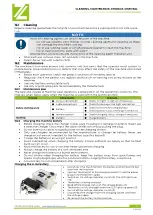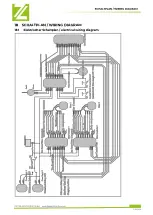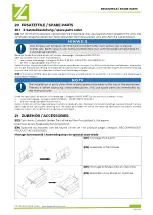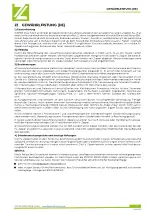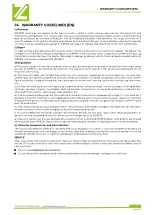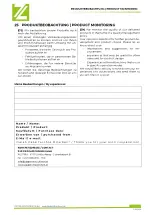
SAFETY
21
ZI-ED400
•
Ensure that unauthorised persons maintain a safe distance from the machine (10 m) and
keep children away from the machine.
•
The machine may only be operated, serviced or repaired by persons who are familiar with it
and who have been informed of the dangers arising during this work.
•
Always wear suitable personal protective equipment (e.g. ear protection, safety googles,
safety shoes, etc.)!
•
Do not work with the machine if you are tired, not concentrated or under the influence of
medication, alcohol or drugs!
•
Never operate the unit in the presence of flammable liquids or gases (danger of explosion!).
•
Carry out maintenance, adjustment and cleaning work only when the engine is switched off.
•
Only use spare parts and accessories recommended by Zipper machines.
•
Missing or illegible safety labels must be replaced immediately.
12.4
Special safety instructions for the operation of the machine
•
Do not use the machine if it is raining, wet or has high humidity. RISK OF ELECTRIC SHOCK.
DANGER OF LIFE!
•
Avoid using the machine on wet grass or soft ground. There is a danger of slipping!
•
Be careful with uneven working surfaces as well as working surfaces with slopes. Never move
on slopes with an inclination of more than 12°!
•
Be especially careful when turning the machine or moving it backwards!
•
Never park the machine on unstable ground that could slacken.
•
Never leave the running machine unattended!
•
Operate the remote control only when within sight of the machine.
Safety instructions for handling batteries
•
When installing the battery into the machine, pay attention that the battery is connected
correctly (positive and negative pole).
•
Never remove the battery's pole cables while the machine is in operation. Risk of electric
shock!
•
RISK OF EXPLOSION! Protect battery from heat, fire and water.
•
Batteries must never be modified or manipulated.
•
Only use batteries that are in perfect condition.
•
Criteria under which the use of the battery must be stopped immediately: Odour develop-
ment, unusual heating, discolouration, deformation as well as mechanical damage.
•
Faulty or damaged batteries may exhibit unpredictable behaviour which may lead to spark-
ing, fire, explosion to injury.
•
General safety instructions:
o
Vapours emitted from the battery may irritate the respiratory tract. In this case, inhale
fresh air and consult a doctor in case of discomfort.
o
In case of skin or eye contact with the emitted electrolyte, rinse the affected areas
thoroughly with water for at least 15 minutes. In case of eye contact, rinse thoroughly
with water, also under the eyelids, and contact a doctor anyway.
o
If the electrolyte is swallowed, rinse the mouth and surrounding area with water.
Contact a doctor.
•
DANGER OF SHORT CIRCUIT! During transport, storage or disposal, the battery must be
packed (plastic bag, box) and its poles taped with insulating tape.
•
Keep batteries away from metallic objects such as paper clips, coins, keys, screws or other
metallic objects. This can cause bridging of the poles. A short circuit between the poles can
result in burns or fire.
•
Handle discharged batteries with care. Batteries are never completely discharged. In the
event of a short circuit, the residual energy contained can lead to considerable heat develop-
ment and cause fire.
12.5
Hazard warnings
12.5.1
Residual risks
Despite intended use, certain residual risks remain.
•
Risk of crushing due moving machine parts.
12.5.2
Hazardous situations
Due to the design and construction of the machine, hazardous situations may occur which are iden-
tified as follows in these operating instructions:

